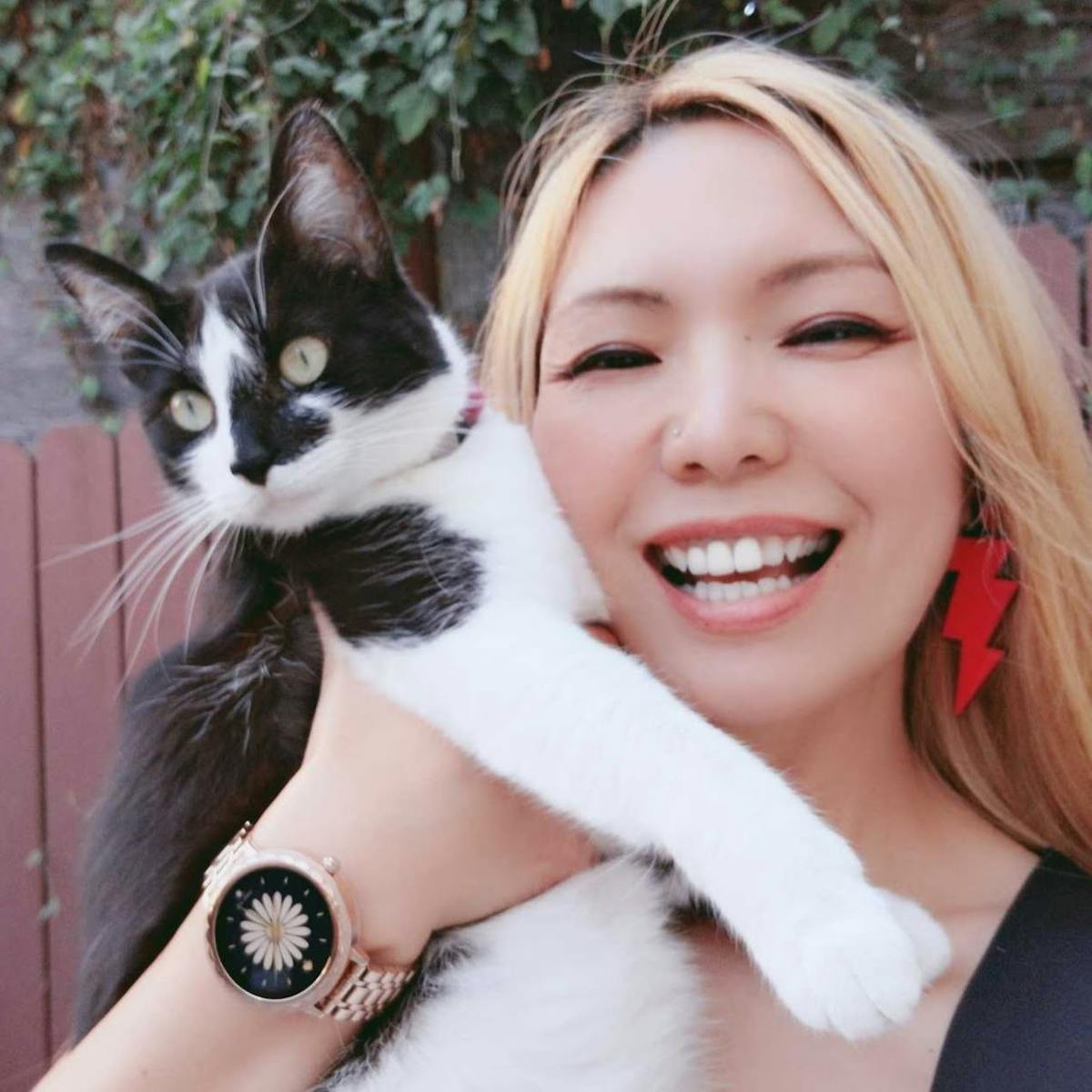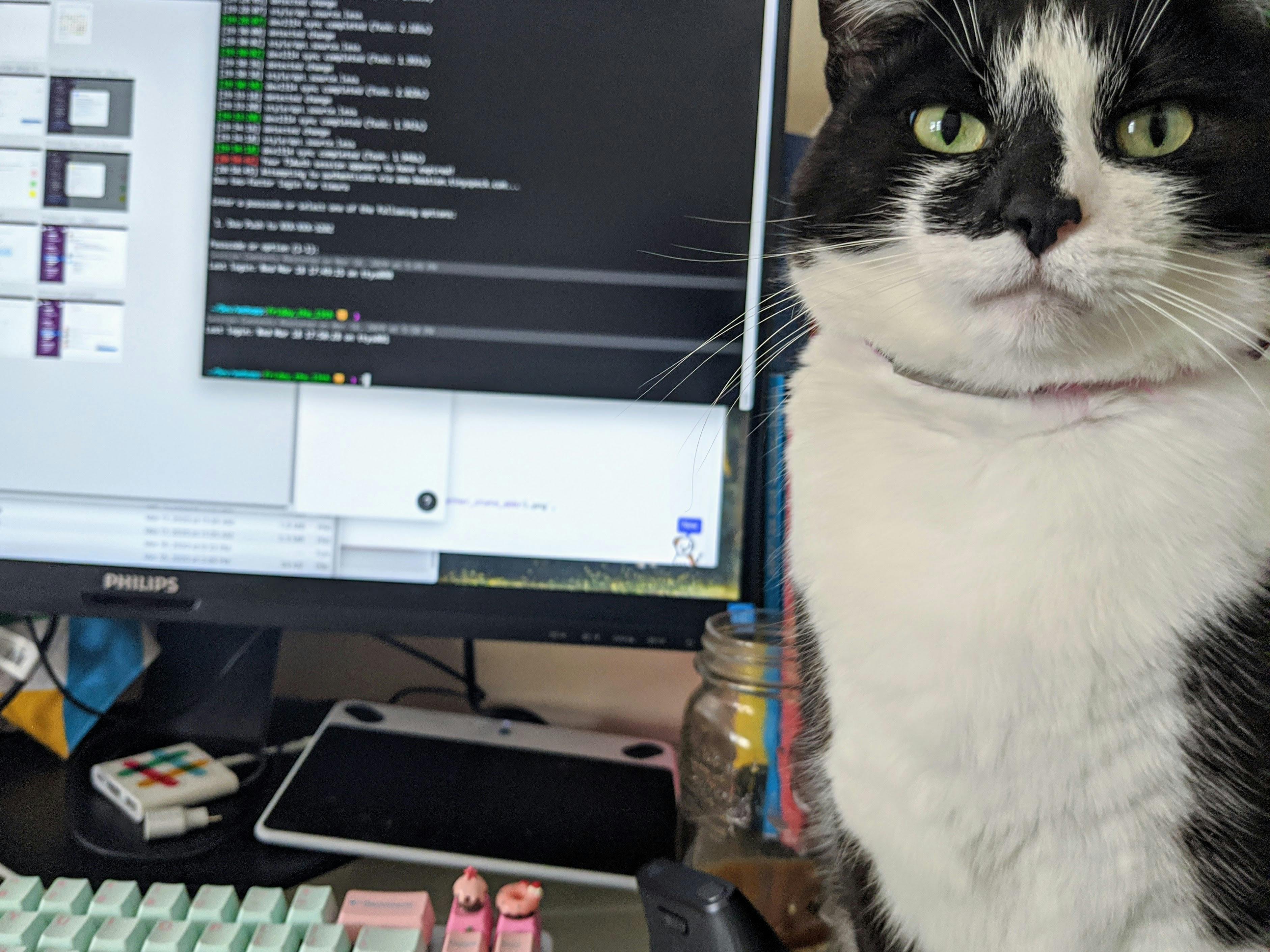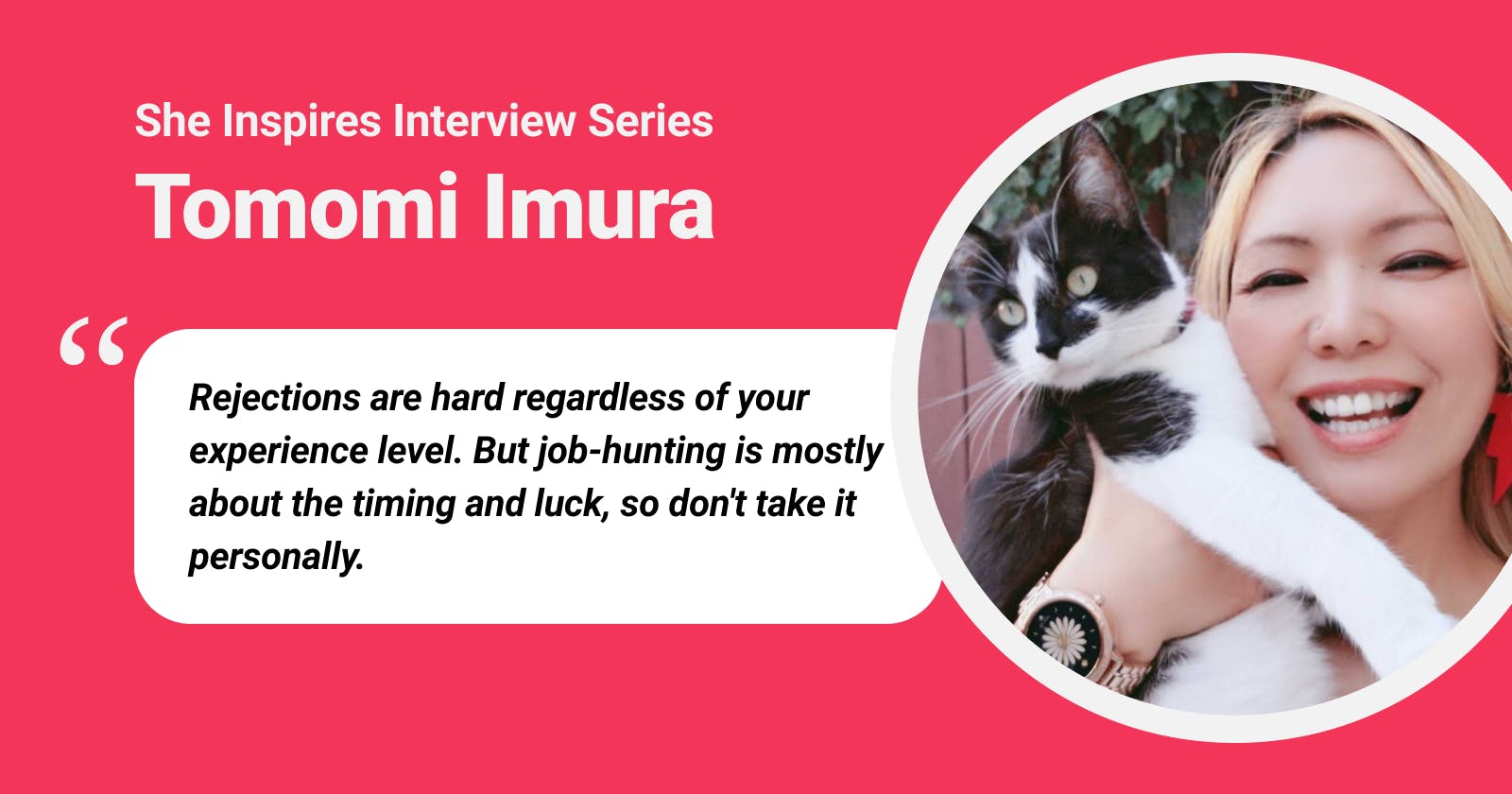Rejections are hard regardless of your experience level. But job-hunting is mostly about the timing and luck, so don't take it personally.
— Tomomi Imura

I interview leading women developers every week and showcase their history, opinions, and advice on the tech. In case you missed our previous interviews, check out the series on Hashnode.
If this interview was helpful to you, please share it with your friends and colleagues and help others 🚀🙂.
Today, we will be interviewing Tomomi Imura 👩💻.
Tomomi is a seasoned technical Developer Relations / Developer Experience specialist who currently works in Developer Relations (API & Developer Education) at Slack. She is an Open Web advocate and front-end engineer, who loves everything mobile, and writes about HTML5, CSS, JS, UX, tech events, gadgets, etc.
Please tell us a little bit about yourself. How and when did you venture into tech?
Tomomi: Well, when I was a kid, I had no idea what I wanted to be when I grew up, and I spent a chunk of my teenage years playing a band.
After college, I ended up becoming a microbiology researcher in Boston, where I did a lot of data analysis and maintained the web pages. Long story short, I realized what I loved more and decided to leave the field to join a software startup as a web developer.
I just oversimplified how I got into tech, but to be honest, staying in the career was not as smooth as I imagined! I'll talk more about it later.
Can you briefly tell us about your job title?
Tomomi: I specialized in developer education, and the role is a combination of engineering, teaching, and strategizing technical content.
People tend to think to be a developer advocate is all about globe-trotting, but the truth is that I spent most of my time staying at my desk, writing tutorials, coding, and staring at Jira tickets.
What difficulties have you faced on your way in tech? Have you ever felt like you were not treated as equal?
Tomomi: San Francisco is a lovely city, but also it is a tough place to be- the tech boom has turned it into the dog-eat-dog world where people do whatever it takes to get their success. People with privilege do know how to take advantage fully.
Unconscious bias does exist in my everyday life, too. The implicit bias creates a barrier for underrepresented people to climb up the ladder.
If there’s a bias women face, why do you think it is still there, in the 21st century? What are some things people and organizations could do to change this?
Tomomi: Unfortunately, implicit bias is not something you can get rid of easily.
To ensure equality, we need help from individuals to make sure not to oppress us- stuff I see often is someone taking a full credit from underrepresented people. Please stop. If you witness it, please step forward and reward the right people.
And I want companies and organizations to reconsider diversity because it is not about the minority head-count quota. Pay and position equality matters.
Before now, you worked at various companies in the mobile industry. How was life at these companies? When and why did you decide to make a shift to Developer Relations?
Tomomi: I used to be such a mobile geek. So naturally, I loved all my mobile jobs so much, and I even miss it sometimes. I actually switched my career from engineering to Developer Relations when I was working at Palm webOS team.
Long story short, I had no idea what DevRel was at that time, but basically how I made my transition is that I begged the team leaders to let me work with them as I was a massive fan of their tech blog. (If you wonder who I am referring, well, they are Dion Almaer and Ben Galbraith!)
Soon I figured it was the job I wanted! I could use all of my unique skills and experiences.
You currently work in Developer Relations (API & Developer Education) at Slack, how long did it take you to arrive here and what significant difficulties did you face along the way?
Tomomi: For me, it seemed to be a long way. My tech career began in a bad economy when companies were reducing headcounts, so I had to make extra efforts to just land on a job for a while. Also, I probably identified only a few female DevRel professionals in the industry around the time I started.
After working for DevRel in years, what I found hard is that the job requires quick adaptation and flexibility with technology. Every time I switch companies, or even when switching teams, I have to acquire the knowledge about the products (API, platform, tools, etc.) quickly to the expert level.
Also, every company operates the function in entirely different ways, and it often depends on where the organization falls under- it can be engineering, marketing, products... could be even business development or sales!
We see that you work predominately in Developer Relations, Open Web, Front-end Engineering and Technical Writing. How did you decide to focus on these paths?
Tomomi: To be honest, I didn't really decide to focus on the path. Even when I was a full-time coding, writing docs was still an important part of the job. Besides my job, I was still enjoying writing technical blogs and talk about technology, and it became my full-time job!
What advice do you have for a newbie or intermediate who dreams to work in Developer Relations?
Tomomi: Developer Relations focus on technology AND people! Being a respected DevRel professional, of course, you need to show your technical domain expertise well. But, more importantly, you need to be trusted by developers and the developer community with empathy to understand their needs and pains.
Unlike "Software developer" title, "Developer" in Developer Relations (including developer advocate, developer evangelists, etc. titles) is not about you as a developer, but it is the people you support. So, work on the skills on how to share your knowledge with other people- it can be writing cleaner code with appropriate comments, then document clearly. Participating open source is great too, also, writing technical blog posts, giving talks at meetups or brown-bag sessions to your coworkers, are all essential skills.
How long have you been in tech and what word will describe your experience so far?
Tomomi: I've been in tech for longer than 15 years and lost count. I am just happy to make a living for doing what I like, but of course, not everything goes in the way I want. Some times I'm treated like a rockstar on stage, sometimes I'm disregarded as if I don't exist at a meeting. There have always been up and down, so I guess I can describe my experience has been quite mercurial.
You are a "writing machine" Tomomi, what's your super power?
Tomomi: Hahaha, thank you. This is probably more an introvert way of expressing myself.
Actually, it all started with my struggles- I always have a hard time learning new APIs, frameworks, platforms, and tools, especially when there are no easy-to-follow tutorials found, so I often take notes as I go. Then one day, I was like, "Why don't I publish the notes so somebody else can benefit from what I just learned?"
When I publish something wrong, or there are better ways to do, there are always people in the community tell me about it. So, by writing, you are not always giving away, but receiving a lot of brains too!
What advice do you have for beginners or intermediates who look forward to technical writing?
Tomomi: Something I always keep in mind is that writing clearly with simple English, especially if you want to reach out to people whose primary language is not English too. At the same time, having your persona is essential because technical writing doesn't have to be machine-like as it sounds. You are writing for people. Know your audience and talk to them with your writings.
To be honest, I am a terrible writer. I have a lot of grammatical mistakes and poor vocabulary. So I rely on tools like Grammarly, which I highly recommend!
We see that you speak and teach at software conferences, how did you get into public speaking and how has it affected your career?
Tomomi: OMG, I was horrified first. It was probably about 8 or 9 years ago when my technical blog was well-received by the community. I was asked to give a talk about the subject at a conference. It was about HTML5 on mobile. I don't think I did well at all, but eventually, it led me to work with W3C to advocate web technology on mobile.
Being seen on stage helped me earlier in my career, but now, giving talks at conferences is more philosophical and not all about career, unless I am speaking at the company-led conferences.
What advice would you give to aspiring programmers who look forward to speaking at meetups and/ or conferences?
Tomomi: I'd say, first, pick some good topics you're comfortable with, or share your story about how you work/code/debug/use tools, etc. As long as you are confident with the topic, you will do well. If you don't know where you can give a talk, ask the organizers of your favorite meetups.
Don't think about memorizing the script, just use bullet points on slides to guide your talk. Also, most importantly, breathe and stay hydrated (but not too hydrated!) before your talk.
What do you think needs to be done to encourage beginner developers to learn programming languages and continue learning?
Tomomi: Boost motivation by being exposed to interesting people, projects, and ideas.
Also, identifying your best learning methods! If you feel discouraged learning from books, a reading may not be your style. Try watching videos on YouTube or take online courses like Coursera, Udacity, etc. Or try participating in a hackathon. Some people learn better from the process of brainstorming and build ideas into a product.
Imposter syndrome is one problem developers face especially newbies, what is your experience with imposter syndrome, how did you manage yours and what advice do you have for anyone facing this currently?
Tomomi: I still have imposter syndrome and think it is chronic. Even when I am an expert on some subjects, soon, I start feeling that my knowledge may be already outdated. It is a constant fear.
However, even people who I look up to told me that they feel that way too. So well, I am not alone and you are not either. It is okay to feel that way. Confidence is important but you have no reason to be over-confident.
Rejection emails are another thing that motivates imposter syndrome and depression amongst developers especially intermediates. How did you manage this effectively during your "job-hunting" days?
Tomomi: I would like to know the answer too! Rejections are hard regardless of your experience level. But job-hunting is mostly about the timing and luck, so don't take it personally.
What advice would you give to aspiring programmers who look forward to working for companies like Netlify or Microsoft?
Tomomi: I don't have advice about particular companies, because I believe you should pick your jobs based on the product you love or specific roles/teams you would like to work.
But if you have some dream companies you really want to get in, a referral is the best way. Find somebody you know on LinkedIn. I get messages from my old coworkers all the time!
Which of your projects are you most proud of? Can you briefly introduce us to it and why you built it?
Tomomi: The work projects I am proud of are Yahoo! mobile on the very first iPhone in 2007, and webOS in 2009. Celebrating the releases with physical devices feels very, very special.
My fave personal project maybe KittyCam with Raspberry Pi. This project also involves hardware and software- I wired up Raspberry Pi with a motion sensor and a camera and wrote a node.js app using a cat facial detection library. Yes, cats' faces! It is the most starred project I wrote on GitHub too.
Why I built it? It all started when I was at a meetup and casually told my vague idea to Bryan Hughs, who wrote Raspi-io, I/O plugin for Johnny-Five, JavaScript robotics framework. His advice drove me to complete the project.
It is always good to talk about your ideas to somebody who can motivate you!
What is the best advice someone has given you that has helped you in your career?
Tomomi: Aside from technical skills, I remember what Edith Cooper, who is the board director of the company I worked at, and powerful woman in color in the industry, told us when she came to talk to our small gathering. She emphasized to get out of my comfort zone and seek out for people and opportunities.
I consider myself as somewhat introvert, so asking somebody who I barely know requires a lot of courage, but it results in great conversations that lead to new projects or careers.
What are your favorite programming tools?
Tomomi: VSCode! You can customize and automate the way you want from pretty ligature font to linting rules.
I give a lot of workshops and webinars, so for teaching people, I found Glitch very useful because you can code and run Node.js on your browser.
What does your development environment look like? Could you please share a photo? :)

My physical environment is usually trashed by this bad cat. Another cat is a good boy who doesn't bother me too much.
Finally, what would be your message to women trying to get into technology?
Tomomi: Work on some projects, write about them and share it on social media. It would give you confidence and connect with people who have the same interests.
Also, I want to say this to women of all levels- Let's inspire and empower each other! You may feel you are competing for small job slots for women with other women. Yes, it is hard to get into the boys club, but let's not limit ourselves to 25% of the job market. If we help each other, we can raise the number higher, so all of us get what we want!
Thanks for taking out time to read this interview. 👋
This series is all about talking to the awesome women in tech, understanding the current health of the tech industry and inspiring other women to become better. If you want to share your story, please reach out to me on Hashnode.
Did you find Tomomi's story useful and inspiring? Write down your thoughts in the comments section below and don't forget to share this interview. You can also follow Hashnode on Twitter to stay up-to-date with our future She Inspires interviews.
See you next time and keep trailblazing 💪💙

